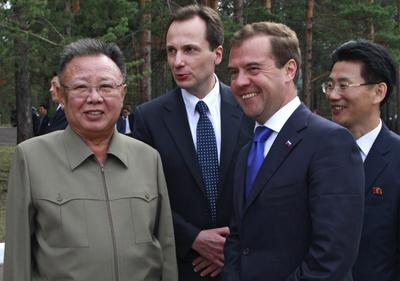This is an interesting and important project, so it is pertinent to take a brief look at its background, and at the state of the economic interaction between Russia and North Korea.
In 2010, the volume of trade between these two countries was merely US$110 million. As international trade goes, this volume is tiny. By comparison, in the same year North Korea’s trade with China was around US$3.4 billion, some 30 times larger than its trade with Russia.
The reason for this inactivity is quite simple: Russian companies have no interest in dealing with North Korea. In the Soviet era, trade flourished because it was subsidized due to the geopolitical concerns of Moscow. Currently, when it comes to purely economic considerations, North Korea has almost nothing to offer the new Russian economy.
North Korea has only two resources that can be sold on the international market. First, it has deposits of minerals (coal, iron ore). Second, it has a relatively large pool of cheap labour — or to put things in a less cynically capitalist way, there are millions of North Koreans willing to work for US$10 a month.
But Russian companies are decisively uninterested in North Korean minerals. These mines may be attractive to resource-hungry China, but not to Russia, which has the riches of Siberia at its disposal. The chronic political instability in which North Korea is immersed is another reason which lessens Russian interest in North Korean minerals.
Cheap labour is more attractive, and indeed Russia has continuously used North Korean labour since 1967, but not in the North itself. Some Chinese companies began to outsource to North Korea, and built small factories there, in order to take advantage of the obscenely low local wages. This approach is not very attractive to Russia, since it is not a major player in producing winter parkas, wool hoods, or running shoes. Russian companies prefer to use North Korean workers inside Russia itself.
These workers are sent to Russia by the North Korean authorities and can be described as indentured labour. Their families are hostages who can be punished if a worker does something improper and the workers are also expected to ‘donate’ a significant part of their wages to the state. Despite these harsh conditions, one should not forget that these jobs are among the best paid regular jobs in the country. North Koreans compete for opportunities to become indentured labourers in Russia.
That said, the scale of these ventures is rather limited, as is the demand for cheap labour in the Russian Far East (the only part of Russia where the use of North Korean labourers really makes practical sense).
Aside from this, North Korea has something else to offer — its geographical location. This country blocks all land routes to the prosperous South. Russia has much interest in the South Korean market, especially when it comes to the sale of natural resources. Impeding this is the existence of North Korea, and the continued strained relations between the two Korean states, making sales of Russian commodities rather difficult.
So it is not incidental that the two most important potential projects are a railway and a gas pipeline. Both projects can hardly be described as ‘economic cooperation’ between North Korea and Russia, since neither has much to do with the North Korean economy itself. North Korea, in these cases, is merely as a space to be traversed. It would be no different if it were a dessert or jungle. Russia is willing to pay North Korea for facilitating Russia’s economic link with the South, and that is all.
So it is not surprising that an agreement on the pipeline construction was signed after the Russian-North Korean summit. This project is indeed acceptable to the North, since it will mean easy money for transit, it is favourable to Russia, and it will be good for the general situation since it will bind Russia, North and South Korea closer.
Yet, a word of caution is necessary. In spite of all official statements, we should not expect large-scale construction work to begin in the near future. The political risks remain huge, so it is likely that Russian companies will not rush headlong into the project. The recent agreement should rather be seen as a declaration of intent. In all probability, the trans-Korean pipeline and trans-Korean railway will be built eventually. But the completion of these important initiatives will probably take many, many years.
Andrei Lankov is Professor at Kookmin University in Seoul and an adjunct research fellow at The Australian National University.
This article was first posted here in the Korea Times.

